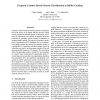Free Online Productivity Tools
i2Speak
i2Symbol
i2OCR
iTex2Img
iWeb2Print
iWeb2Shot
i2Type
iPdf2Split
iPdf2Merge
i2Bopomofo
i2Arabic
i2Style
i2Image
i2PDF
iLatex2Rtf
Sci2ools
110
click to vote
OSDI
2004
ACM
2004
ACM
Program-Counter-Based Pattern Classification in Buffer Caching
Program-counter-based (PC-based) prediction techniques have been shown to be highly effective and are widely used in computer architecture design. In this paper, we explore the opportunity and viability of applying PC-based prediction to operating systems design, in particular, to optimize buffer caching. We propose a Program-Counterbased Classification (PCC) technique for use in patternbased buffer caching that allows the operating system to correlate the I/O operations with the program context in which they are issued via the program counters of the call instructions that trigger the I/O requests. This correlation allows the operating system to classify I/O access pattern on a per-PC basis which achieves significantly better accuracy than previous per-file or per-application classification techniques. PCC also performs classification more quickly as per-PC pattern just needs to be learned once. We evaluate PCC via trace-driven simulations and an implementation in Linux, and compare ...
Buffer Caching | Operating System | OSDI 2004 | Per-application Classification Techniques | State-ofthe-art Pattern-based Buffer |
| Added | 03 Dec 2009 |
| Updated | 03 Dec 2009 |
| Type | Conference |
| Year | 2004 |
| Where | OSDI |
| Authors | Chris Gniady, Ali Raza Butt, Y. Charlie Hu |
Comments (0)

